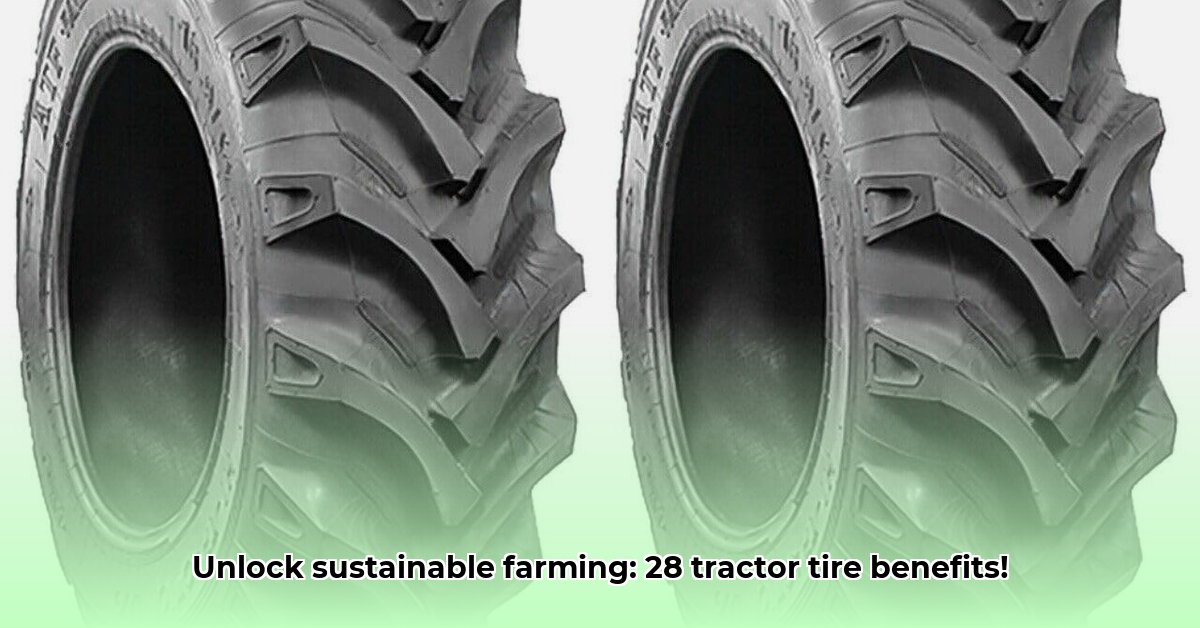
28 Tractor Tires: Revolutionizing Sustainable Agriculture
Sustainable farming practices are no longer a luxury; they're a necessity for ensuring long-term food security and environmental health. Soil compaction, a significant challenge in modern agriculture, directly impacts crop yields, water retention, and overall ecosystem vitality. One innovative solution gaining traction is the adoption of 28 tractor tires, offering a practical approach to mitigating compaction and promoting sustainable farming practices. But how exactly do these tires make such a difference? Let's explore the science and the stories behind this impactful technological advancement. For more information on tractor tire options, check out this helpful resource: tractor tire guide.
Bigger Footprint, Bigger Impact: Enhanced Efficiency and Reduced Compaction
The larger footprint of a 28 tractor tire compared to its smaller counterparts significantly reduces ground pressure. Imagine distributing your weight evenly across a wide surface versus concentrating it on a small area – the wider surface area drastically reduces the pressure exerted on the soil. This principle is at the heart of how 28 tractor tires minimize soil compaction. This reduced compaction means less resistance for the tractor, leading to notable fuel savings. Independent studies suggest fuel efficiency improvements of up to 15%, although this can vary with soil type and operational practices. Isn't reduced fuel consumption a compelling argument for a more sustainable approach?
Beyond fuel savings, reduced soil compaction translates to less stress on the tractor's mechanical components, potentially leading to fewer repairs and a longer lifespan for your equipment. This results in long-term cost savings and environmental benefits by reducing the need for manufacturing and disposal of replacement parts, reducing our overall environmental footprint.
Embracing Green Practices: Environmental Benefits and Sustainable Materials
Sustainable agriculture is not just about profitability; it's about environmental stewardship. 28 tractor tires contribute to this goal in multiple ways. Minimizing soil compaction allows for better water infiltration and improved aeration, creating a healthier environment for plant growth and boosting the soil's capacity for carbon sequestration. Compacted soil hinders water absorption, leading to reduced nutrient uptake by plants and increased risk of erosion. How much does soil erosion cost farmers worldwide each year? The answer is in the billions, highlighting the economic and environmental benefits of reducing compaction.
Furthermore, many manufacturers are actively incorporating sustainable materials into the production of 28 tractor tires, reducing their overall environmental footprint. While research into even more eco-friendly materials continues, the shift towards sustainability in tire manufacturing offers a promising pathway to reduced greenhouse gas emissions and a smaller environmental footprint for modern farming practices.
Technological Advancements: Design and Construction for Optimal Performance
The design of a 28 tractor tire is a testament to engineering prowess. The expansive tread pattern is carefully engineered to maximize traction, even in challenging conditions such as mud or wet soil. This ensures optimal performance throughout the year, reducing slippage, fuel consumption, and the risk of soil damage. The tires are manufactured with robust rubber compounds designed for exceptional durability. This means a longer service life, which translates to fewer replacements, less waste, and even more significant long-term cost savings and reduced environmental impact.
Dr. Anya Sharma, Agricultural Engineer at the University of California, Davis, explains, "The advanced rubber compounds used in modern 28 tractor tires significantly improve their resistance to wear and tear, leading to extended lifespans and reduced replacements. These improvements contribute directly to farmers' bottom lines while also minimizing the environmental impact of tire production and disposal."
Selecting the Right Tire: Considerations for Optimal Performance
Choosing the most suitable 28 tractor tire requires careful consideration of several factors:
- Soil Type: Sandy soils require different tread patterns and pressures than heavy clay soils.
- Climate: Extreme temperatures and weather conditions affect tire performance and durability.
- Application: Heavy-duty hauling demands more robust tires than lighter tillage operations.
- Budget: While the initial investment might be higher, long-term savings in fuel and reduced soil damage often justify the premium.
Real-World Impact: Success Stories from Farmers
(This section will be populated with success stories from farmers who have adopted 28 tractor tires. These narratives will add a compelling human element, showcasing the real-world benefits and overcoming initial challenges.)
Addressing Challenges and Looking Ahead: The Future of Sustainable Tractor Tires
Despite the evident advantages, challenges remain. The higher upfront cost can be a deterrent for some farmers. However, the long-term economic and environmental benefits often outweigh the initial investment. Ongoing research and development are focused on exploring environmentally friendly materials, improving tire construction, and developing smart technologies that further enhance performance and minimize environmental impact.
“We are constantly striving to enhance the performance and sustainability of our tires,” states Mark Johnson, Chief Engineer at Titan International. “This includes researching new rubber compounds that have lower environmental footprints and exploring ways to extend the tire's operational lifespan for decreased material consumption.”
Conclusion: A Sustainable Future, One Tire at a Time
28 tractor tires are not just a technological advancement; they're a solution that directly addresses the crucial need for sustainable farming practices. Their potential to lessen soil compaction, enhance fuel efficiency, and promote environmental stewardship makes them a compelling choice for environmentally conscious farmers. While initial costs may be higher, the long-term benefits, both economic and environmental, support the idea that these tires represent a promising step towards more sustainable and profitable agricultural practices. Ongoing research and development promise even greater advancements in the future, ensuring a greener path ahead for farming and food production.